Meet Mindy.

A massive army of enemy soldiers is chasing her, led by an unstoppable warrior that none can withstand. Her companions are flagging; each one exhausted and terrified. They can’t hold out much longer. But it’s imperative that their mission is completed. What’s at stake is greater than any of them.
All they need is a little more time in which to escape. Even just a few seconds might make all the difference. So Mindy comes to a decision. She’s going to stop, turn around, and face the insurmountable odds behind her. She’s about to pull a You Shall Not Pass.
The gesture will probably come at the cost of her own life, but she’s okay with that. If it means her friends can get away safely, or that they’ll successfully complete their all-important mission, it’ll be worth it. Because those bad guys are determined to get past her, and if they do, the consequences will be dire.
It’s important not to confuse what she’s doing with a Last Stand. That’s when a heroine knows full well that she’s going to die and so plans to take as many enemies with her as she can. You Shall Not Pass is more specific in regards to what actually happens during the course of its fulfilment: stopping an enemy from getting somewhere it wants to go, whether it be repelling an invasion, slowing down a single attacker, or something between those two extremes.
But more than that, the crucial difference between the two tropes is that a Last Stand is all about going out with a bang, whereas You Shall Not Pass is about buying time for other people. That, to me, makes it more stirring, more heroic, more selfless – and more rewarding to watch.
And below are some of the most illustrative examples of this trope in action.
Before you start reading, be aware of two major caveats. The first is that these are not what I’d necessarily consider “the best” of the trope (as subjective as that is), but rather examples that I think best illustrate what the trope is about. By choosing these examples, I can hopefully explore the nuances of this storytelling device in more detail, rather than just listing six variations that play out in the exact same way.
Second of all, I can only make this list out of stuff I’ve already seen. So if you feel something obvious is missing, it’s probably because I simply don’t know about it. You’re more than welcome to add it to the comments section, and maybe one day I’ll get the chance to check it out.
1. Gandalf on the Bridge of Khazad-Dum from The Lord of the Rings
Well, obviously. You don’t make a You Shall Not Pass list and not put this on it. It’s probably one of the most famous literary examples of this trope, and Gandalf even goes so far as to yell out the exact words “you shall not pass!” as he faces down the Balrog.
Here’s the setup: The Fellowship is racing through the Mines of Moria, chased by a legion of orcs – and something else. In a brief moment of reprieve, Gandalf shares his fears with the rest of the Fellowship:
"I found myself suddenly faced by something that I have not met before. I could think of nothing to do but try and put a shutting spell on the door... As I stood there I heard orc-voices on the other side: at any moment I thought they would burst it open. I could not hear what was said; they seemed to be talking in their own hideous language. All I heard was ghash: that is “fire”. Then something came into the chamber – I felt it through the door, and the orcs themselves were afraid and fell silent."
They race through the Second and First Hall of Moria to the Bridge of Khazad-Dum, a structure so narrow that they’re forced to go across in single file. Behind them swarm hundreds of orcs and trolls, but Legolas notices in terror that they are falling back in the face of a terrible great shadow that rises up behind them. Gandalf orders the others to escape across the bridge as he takes position in the middle of the span, facing the Balrog with only his staff and sword: grey and bent, like a wizened tree before the onset of a storm.
The film captures the scene almost to the letter:
Damn. That Hope Spot gets me every time: the moment in which it appears Gandalf is triumphant, only for the lash of the Balrog’s whip to twine around his ankle and drag him to his (supposed) doom.
Why does it work so well? In recent years Peter Jackson has become so enamoured of computer-generated special effects that his films have lost some of their humanity. But in The Fellowship of the Ring there were some beautiful touches in the lead-up to Gandalf’s You Shall Not Pass, namely the myriad of hints that Gandalf knew what was waiting for him in the Mines of Moira. Ian McKellan does a sublime job of conveying Gandalf’s secret dread as the Fellowship head closer and closer to his sacrifice.
And it’s that foreknowledge more than anything that makes it such a powerful example of the trope. This is what You Shall Not Pass is all about: knowingly putting yourself in danger for the sake of others, with no guarantee that your actions will have pay-off, and hoping only to buy more time for those who need it. Even Gandalf’s famous last words: “fly you fools!” is based on his concern for the others.
In other words, this is a perfect You Shall Not Pass. It doesn’t get more iconic than this.
2. The Spartan Army at the Battle of Thermopylae from 300
This is another shoe-in for the list, the more so because it has the added bonus of being based on real history. Granted, the Battle of Thermopylae could just as easily be categorized as a Last Stand, what with the alliance of Greek armies holding their ground against the invading Persian Empire against overwhelming odds, but there is an element of self-sacrifice and stalling for time that also makes it a quintessential You Shall Not Pass.
Here’s the setup: the Persian Empire is invading Greece, and the warring city-states have decided to unite against the greater threat. There are two locales where the Greeks plan to deflect Persian advancement: the Straits of Artemisium and the Pass of Thermopylae. In the summer of 480 BC, a Greek force of approximately seven thousand men march north to block the pass, including three hundred Spartans led by their king Leonidas.
Facing a Persian army of about one hundred thousand men trying to force their way through the pass and onto the mainland (whatever the true figure, suffice to say they were vastly outnumbered), the objective of the Greeks is very simple: stop them.
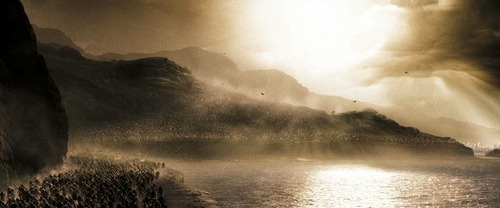
For seven days (three of battle) the Greeks hold out against the Persians, their overwhelming numbers nullified by the Greeks’ ingenious use of the geography to funnel the enemy army and easily dispatch their restricted numbers. It’s only after the Greeks are betrayed that the battle turns in Xerxes’s favour with the discovery of a small path that leads behind the Greek lines. Now their position is compromised.
On realizing defeat is inevitable, the entire Greek army cannot simply get up and leave. As soon as the enemy realizes the front is being thinned, they’ll attack. An evacuation must be done in stages; small units departing in a phase withdrawal. But this – you guessed it – takes time.
There’s a lot of speculation as to why the real King Leonidas chose to stay and fight to the last man. Some believe it was a matter of honour (Spartans were not supposed to retreat; though others think that it was this very event that gave rise to that decree), others that Leonidas was fulfilling a prophesy that had been told before he left for battle: that only by his death could Sparta be saved. But the theory that most ascribe to (and what makes it qualify for this trope) is that Leonidas chose to form a rear-guard so that the rest of the Greek army could safely retreat.
Perhaps disappointingly, the movie 300 tries to sell his decision as a matter of honour and destiny; of the proud outnumbered Spartans refusing to bow to foreigners; of each man hoping that their sacrifice will spur others into taking arms against the Persian invaders. This takes much away from the role the 300 Spartans (and uncredited Thespians and Thebans that stayed with them) played as a covering force for a tactical withdrawal, giving the Greeks behind them the opportunity to get away and reassemble.
Yet despite this, the subject matter means the film cannot help but adhere to the tenets of You Shall Not Pass. Even in the midst of slow-motion anachronisms and stylistic abdominal muscles, the crux of the storyline rests on the fact that Greek soldiers held the Thermopylae Pass: first to deflect the invaders, then to permit the escape of their countrymen.
If you can look past the questionable aspects of the film (it caught some flak for its portrayal of the Persians), then its basis in history makes it all the more stirring. This really happened. And best of all, the sacrifice paid off – in a sense. Though Thermopylae was ultimately a victory for the invading Persian army, the inspirational example it set means that it is the Spartans, not the Persians, who have since been immortalized in Western culture.
3. River Tam from Serenity
Admit it, you either cried or cheered (or both) when River Tam bid her brother a tearful farewell and sprinted down the facility tunnel to take on the gang of Reavers hammering at the door. But what really makes this example qualify for the list is that it beautifully merges the two fundamental reasons why anyone would pull a You Shall Not Pass: for the sake of a cause greater than oneself, and to save the life of another person.
Here’s the set up: Thousands of years into the future, humanity has terraformed and colonized hundreds of planets, most of them united under the governmental body known as the Alliance. A rebellion fought by the Independents has failed, among them Captain Malcolm Reynolds of the rundown freighter-ship Serenity.
But the Alliance has some dark secrets; one of them being River Tam, a psychic and hyper-intelligent teenager whose brother Simon successfully smuggled her out of the Alliance base and hid her on board Serenity. She has plenty of secrets stored away in her brain, one of them being the fate of the terraformed planet Miranda.
On investigating, the crew of Serenity discover a world full of dead bodies that have seemingly just laid down and died. A holographic message from an Alliance soldier explains that a gas called “Pax” was filtered into the atmosphere in the hopes that it would root out aggression in the population. It worked – a little too well. Thirty million people simply lost the desire to live.
But in one-tenth of the population, the Pax had the opposite effect, resulting in the bogeymen that have haunted the show from its inception: Reavers. They’re mindless, raping, flaying, animalistic cannibals – and they’re the work of the Alliance.
Armed with this terrible secret, the crew of Serenity performs a classic You Shall Not Pass as they hold off the Reavers storming the facility where they hope to broadcast the holographic message to the galaxy. While Mal goes on ahead to the backup unit, the rest of the crew plan to buy him the time he needs by drawing the fire of the Reavers.
With only a few weapons and a wall of crates, they hold out for as long as they can before retreating through the blast doors – which can only close from the outside. River is a terrified wreck, only to snap out of her panic when Simon is shot. Standing over him, she says... well, see for yourself:
I think my favourite touch is that before the blast doors close, River remembers to grab Simon’s medical bag and throw it through the narrowing gap. And that Joss Whedon takes full advantage of Summer Glau’s dancing ability to choreograph the fight scene.
Why does it work so well? The key to this example is payoff. When River decides to throw herself into the fray and battle over a dozen Reavers by herself, it’s actually the climax of three story-arcs that were carefully established not only in the film, but in the television series that preceded it.
Despite FOX network cancelling Firefly before it had even finished its first season, Joss Whedon still had the advantage of drawing upon what had been initiated on the small-screen to shape the course of the film. This was the culmination of River’s portrayal as a traumatized but powerful teenage girl, Mal’s loss of purpose after the defeat of the Independents, and the relationship between the Tam siblings, arguably the core dynamic of the entire show.
As I said before, the Serenity crew holding off the Reavers encompasses both motivations that usually accompany the You Shall Not Pass trope. Mal and the rest of the crew are prepared to fight and die for their cause, having accepted the responsibility to speak on behalf of those the Alliance has destroyed in their bid to control human behaviour.
But River is spurred to fight only when Simon is injured. After fourteen episodes and a feature film depicting Simon as The Caretaker to his extremely volatile sister, River now steps up. And after being depicted for so long as a victim of torture and experimentation, after years of being groomed as a human weapon by the Alliance, it’s an intensely rewarding moment when she finally gets to unleash all that she’s become against the very people who shaped her.
4. Septa Mordane and Syrio Forel from Game of Thrones
I’ll admit, I was in agony over making this choice, simply because one of the show’s most recent episodes (The Watchers on the Wall) had another near-perfect demonstration of this trope. A mere six members of the Night's Watch hold the inner gate of the tunnel against a gigantic, furious, terrifying giant whilst shouting their vows. They pay with their lives, but they hold the gate.
Yet I’m not choosing that example. I’m passing in favour of something that happened way back in season 1.
Here’s the setup: After the death of King Robert Baratheon and the revelation that Ned Stark knows the truth about the heir's incestuous origins, the Lannisters make their move against the Starks. Hoping to silence them, members of the Kingsguard are rounding up the family; slaughtering the servants and taking the children into custody. Or at least trying to.
Arya Stark is practicing sword fighting with her tutor Syrio Forel, and Sansa Stark is walking the corridors with her nursemaid Septa Mordane. As soon as the adults realize what’s going on, both move to protect the children in their care: Septa Mordane by instructing Sansa to run to her room and bar the door; Syrio Forel by using a wooden practice sword to deliver a pretty epic smack-down against six armed men.

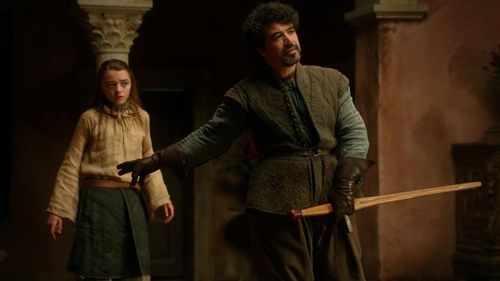
But both gestures are doomed. Although Syrio buys Arya enough time to escape, the Lannister men quickly recover and surround him, shattering his practice sword and presumably killing him. Septa Mordane’s sacrifice is doubly-tragic, for not only is she killed by the soldiers, but her gesture is ultimately futile. Sansa is taken captive and becomes a hostage to the Lannisters.
Yet Mordane's final moment, in which she approaches the bloody swords of the approaching Kingsguard, with nothing but her own body to defend herself with and clearly no plan to slow them down beyond simply standing there, is one of the most powerful death scenes of the show (and that’s saying something considering the amount of deaths depicted in Game of Thrones).
If she had gone with Sansa she would have only slowed her down. She chooses to stay and stare down her murderers on the off-chance it will buy Sansa a few extra seconds to get to her room. It’s no less heroic or powerful than Syrio’s flashy sword-play and verbal disgust towards those that would threaten a child.
Why does it work so well? And why did I pick this over the Night's Watch taking down a giant?
Here’s the thing: parents will do anything for their offspring. It’s a given that any mother or father will willingly give up their lives to protect their own children. But there is a great unifying understanding that exists throughout the world – that we should look out for those who are most vulnerable. That is, children.
Every parent desperately wants to believe that if their child is hurt or endangered while they’re not around, somebody else will step up to protect them.
And that’s what happens here, even though neither Syrio or Mordane will ever be credited for it. Both face their deaths for a child they are responsible for, a child that they love, but also a child that is not their own. Because it's every adult's intrinsic duty to protect a child in need. What kind of person are you if you do not?
Both characters recognise the danger long before the children do (Arya was prepared to go with the Lannisters before Syrio puts his arm out to stop her; Sansa questions Mordane before the latter insists on her leaving), but what I find most interesting about the way their deaths are portrayed (though there is still speculation that Syrio survived) is that both occur off-screen. It emphasizes the idea that it is not their demise, but their actions directly prior to their deaths that matter. In the last few moments of their lives, each one is defined by their choice to protect a child.
5. Shaak Ti from Star Wars: Clone Wars
Right from the start of compiling this list, I knew this example would be included – mainly because this is a perfect example of a You Shall Not Pass failing. As such, it illustrates just how powerful this trope can be, even when it doesn’t work out the way our heroes want it to.
Here’s the setup: The Clone Wars are in full-swing, with the Republic’s clone troopers fighting the Separatists’ droid army on nearly every inhabited planet. Unbeknownst to our Jedi heroes, the entire conflict is being controlled by the secretive Sith Lord Sidious, whose ultimate goal is the transformation of the Republic into an Empire with him at its head.
In disguise as Supreme Chancellor Palpatine, a staunch member of the Republic, Sidious initiates his endgame plan when he arranges for his own kidnapping at the hands of the Separatist General Grievous, all part of a ploy to cast himself into an innocent light and simultaneously lure Anakin over to the Dark Side by pitting him against Darth Tyranus in the rescue attempt that follows.
But the Jedi are unaware of all this. All they know is that Palpatine is an important statesman who must be protected at all costs. Shaak Ti and her companions Foul Moudama and Roron Corobb (where do they get these names?) attempt to escort the Senator to the safety of an underground bunker whilst fighting off MagnaGuards and the terrifying General Grievous. At the bunker’s turbo-lift station, Shaak Ti opts to stay behind and guard the tunnel while Palpatine and the other Jedi go on ahead, buying them enough of a head-start to outrun their pursuers.
What follows is a fantastic fight scene in which Shaak Ti takes on at least a dozen MagnaGuards all by herself. But then, just as she seems overwhelmed... they withdraw. Too late, she realizes the mistake she’s made: by staying behind she’s left Foul and Roron vulnerable to General Grievous, who is lying in wait for them in the bunker.
And of course, the cruellest element to all of this is that neither she nor any of the other Jedi knew that Senator Palpatine was pulling the strings the whole time: he wants to be captured, and he couldn’t care less how many Jedi die in the attempt to protect him. They play completely into his hands. All their sacrifices were in vain. And yet despite this...
Why does it work so well? For the most part, it’s because Shaak Ti fails that the use of this trope is so powerful. Consider this: despite Shaak Ti’s efforts being ultimately futile, and despite the fact that Senator Palpatine gets exactly what he wants, none of it negates Shaak Ti’s heroism or bravery. It’s still a heart-rending sequence, and when you’re caught up in the action, you forget that what’s at stake (in the larger sense) is actually the life of a man whose death would be far more beneficial to the good guys.
That’s the real beauty of this trope: the circumstances can be pointless, the gesture futile, the cause unworthy and the lives of those you seek to protect lost, but it remains that You Shall Not Pass is not just about cause and effect – it’s a mark of characterization. If any character is prepared to pull off a You Shall Not Pass then you have yourself a hero. Period. Whether they’re more motivated by a cause or loved ones, it ultimately doesn’t matter.
It is the act of self-sacrifice, of choosing to fight for something bigger than themselves, of clinging to hope against impossible odds, even if it’s hope for someone else to pull through in the wake of your own death that makes this trope so powerful.
Shaak Ti’s final words in Clone Wars is: “I failed.” She did, to an even greater degree than she was aware of at the time. But at the same time – she didn’t fail. Her You Shall Not Pass was negated, but the fact that she attempted one is a triumph in itself.
6. Mai from Avatar the Last Airbender
There are two reasons for this example’s placement on this list. The first is that it’s a nice twist on the physicality of this trope: instead of pulling a You Shall Not Pass by standing in front of her opponents, Mai actually sneaks up on them from behind in order to slow them down. The second is a bit more personal.
If there’s one trope I hate more than any other, it’s Die For Our Ship, in which a fandom will hate a character because they’re deemed an impediment to another ship (usually fans will come up with a long list of unrelated reasons why they don’t like this character, but you can always tell what their real motivation is; and often their flaws are amplified in order to justify the over-the-top hatred). Bonus points if the preferred ship is clearly not going to become canon anyway, with or without the presence of the perceived “impediment”.
Mai was a huge target of Die For Our Ship from those who shipped Zuko/Katara. Now for the record, there’s nothing wrong with shipping Zutara, and plenty of people managed to do so without raging at the canon love interests. But the amount of vitriol that was ultimately spewed at Mai was just beyond the pale.
So she’s making this list simply because this is her crowning moment, one which vindicates her as a worthy partner for Zuko (not that she needed to prove anything), and because all the stupid reasons haters came up with to diss her were pretty much blown out of the water by this scene.
Here’s the set-up: Prince Zuko has turned his back on the Fire Nation and joined Team Avatar, having finally stood up to his abusive father and decided to right the wrongs his country has inflicted on the rest of the world. But in doing so he had to leave behind his girlfriend Mai, leaving only a note to explain his abandonment of her.
But during a mission to rescue a man from a well-nigh inescapable prison, Zuko and Mai cross paths, allowing Mai the chance to confront him on his decision to ditch her. Suffice to say, it doesn’t go very well.
 |
| They're not getting out of here without some help. |
Once Zuko’s cover is blown, he and his allies race for the gondola that will see them safely off the island, taking the warden with them as a hostage to ensure their captors don’t cut the line and send them all plummeting to their deaths. But the warden, a man obsessed with his “no escapees” record, manages to break free of his bonds and yell “cut the line!” to his underlings. They obey, knowing that he’d rather die than see any prisoners escape.
There’s absolutely nothing Zuko can do as the prison-guards begin sawing through the metal cables that hold the gondolas aloft. But luckily, someone else comes to his rescue.
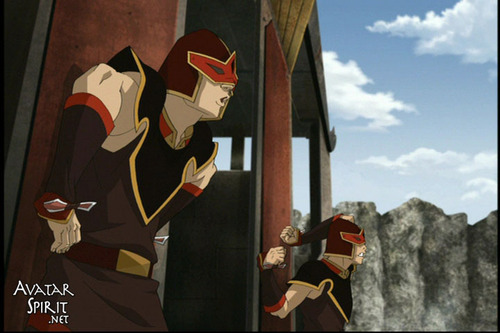
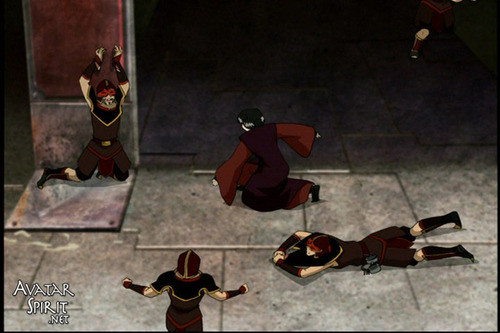
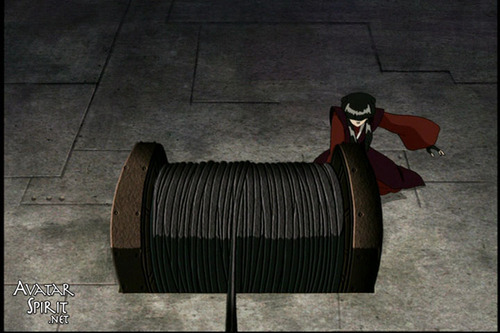
Using her trademark stilettos, Mai pins at least seven of the prison guards to the walls and floor of the prison in order to release the cable without interference and allow Zuko’s escape.
Why does this example work so well? Admittedly, a lot of it has to do with my personal feelings of vindication for a female character that was treated like shit by the fan-base. But the example is hugely rewarding from a characterization point of view.
Throughout the series Mai has been portrayed as a stoic, lethargic, emotionless young woman who didn’t act particularly concerned even when her baby brother went missing. Her skill in knife-throwing was well-established (with the creators revealing that long hours of boredom and loneliness honed her skills), and various fight scenes demonstrated that she could hold her own against more powerful opponents.
And most interesting of all, she seemed to be one of only two people on earth (the other being Iroh) who wasn’t particularly intimidated or afraid of Azula. On more than one occasion she was even seen to stand up to the terrifying princess.
But the only person who seemed able to break through her veneer of coldness was Zuko – a bond that was seemingly broken for good after she furiously confronts him after his capture at Boiling Rock (not helped by the way he locks her in the holding cell as he makes his escape).
Which all means that it came as a surprise when Mai arrived on the scene to secure Zuko’s escape. Yet at the same time, it doesn't seem wildly out of character or totally out of left-field. We know Mai’s feelings for Zuko run deep, we know she’s a gifted knife-thrower, and we know doesn’t live in fear of Azula, despite knowing that there will dire consequences for her defiance.
Unlike some of the other examples, her motivation is entirely personal. Zuko is not the only person on that gondola, but you can tell that Mai doesn’t really give a shit about anyone else. And there’s something rather endearing about that in a character such as Mai. She’s in this for Zuko and Zuko alone – more than that, she’s rising above her own anger and sense of betrayal in order to save the life of the man she loves.
And c’mon, you have to love the line: “I’m saving the jerk who dumped me.”
In short, it’s an interesting perspective flip on the usual way in which a You Shall Not Pass is staged (with Mai stopping the prison guards from behind instead of doubling back and standing her ground), it’s pretty damn badass when you consider this is a teenage girl winning against several armed guards, and it’s a crucial element of Azula’s impending mental breakdown, when Mai coolly informs her that she “miscalculated.”
Love trumped fear. That’s what this trope is all about.
***
So what have we learned here? If you’re writing your very own You Shall Not Pass, then it’s important to understand why this trope is so popular and where its power lies. By doing so, you can ensure that your own version will have just as much resonance as those listed above.
You Shall Not Pass works so well because of the fact that it manages to be both hopeful and tragic at the same time. It’s death and life combined – one character dies so that others can live. It also says so much about the character involved: their selflessness, their understanding of something greater than themselves, and/or their love for their companions.
Whether it’s based on something strictly personal or in service to a cause you really can’t escape the fact that both motivations will become intermingled. There will always be an element of the bigger picture and personal love involved – Mai for example only wanted to save Zuko, but in doing so she started a chain reaction that helped the Avatar save the world. Conversely, the 300 Spartans were carrying out a military manoeuvre in protecting Greece from Persian invasion, but were simultaneously saving the lives of all the soldiers that retreated.
Life and death, big picture and personal love, self-sacrifice and great escapes – it’s a trope that combines extreme opposites, and as such it’s very hard to go wrong in writing about it. The trope hardly ever fails to elicit an emotional response. You’d have to be one of the worst writers of all time to fail with this one.
Yet it’s important to not get this trope mixed up with a Last Stand. If you’re preparing for a Last Stand, your character knows they’ve already lost. Their goal is to simply accrue a body count before they die. A Last Stand is about death, but You Shall Not Pass is ultimately about life.
That makes it inherently more hopeful. It's facing death so that others may live. It’s a desperate stall for time.
A You Shall Not Pass can be as big or as small in terms of physicality as you like, from Gandalf taking on a Balrog to Septa Mordane simply standing in front of approaching soldiers with bloodied swords.
Same difference.
And even if they do fail - even if their friends die or their cause crumbles, the act itself still retains its nobility. Whatever their cause, whoever their friends, they’ve decided that it’s worth their own life to protect.
Capture that mentality, and you’ll end up with a perfect You Shall Not Pass.

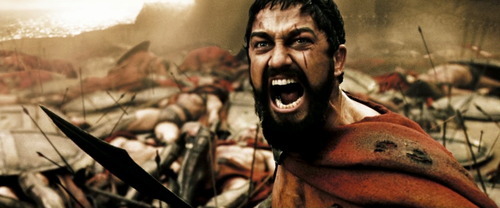











No comments:
Post a Comment